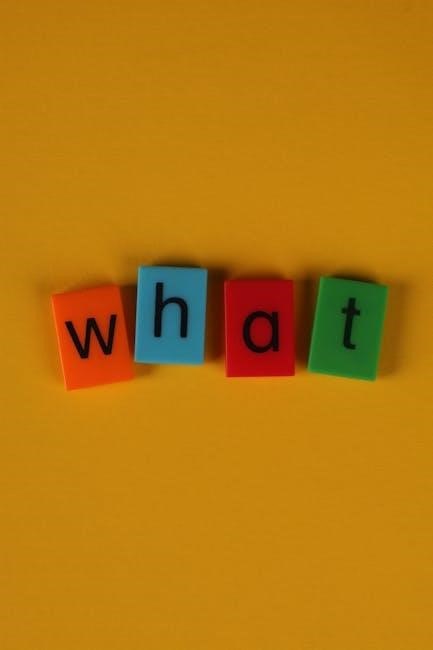year 3 and 4 spelling list pdf

The Year 3 and 4 Spelling List is a curated collection of children in England are expected to master by the end of Year 4․ Part of the National Curriculum, it includes high-frequency, grammar-focused, and tricky words, supported by downloadable PDFs and interactive resources for effective learning․
Importance of Mastering Spelling Skills
Mastering spelling skills is essential for improving writing quality and communication․ Accurate spelling enhances clarity, ensuring ideas are conveyed effectively․ It boosts confidence in writing and supports overall academic performance․ Spelling proficiency also strengthens literacy foundations, enabling better comprehension and expression of thoughts․ By focusing on high-frequency and tricky words, students build a robust vocabulary and improve their ability to articulate ideas clearly․ This skill is vital for success across all subjects and fosters lifelong learning and effective communication․
Overview of the Statutory Spelling List
The statutory spelling list for Years 3 and 4 includes divided into categories like high-frequency, grammar, and tricky words․ These words are selected to reflect common usage and challenging patterns․ The list is structured to build progressively, starting with familiar terms and introducing more complex spellings․ Resources like PDF downloads and interactive tools support learning․ Regular practice and assessment ensure pupils meet the expected standards by Year 4, enhancing their writing and communication skills effectively․

Structure of the Year 3 and 4 Spelling List
The list is divided into categories, including high-frequency words, grammar-focused terms, and tricky or exception words․ It is organized alphabetically, with resources like PDFs available for easy access․
Breakdown of Words by Category
The Year 3 and 4 Spelling List is categorized into high-frequency words, grammar-focused words, and tricky or exception words․ High-frequency words, such as address and appear, are commonly used in writing․ Grammar-focused words like bicycle and calendar emphasize spellings related to sentence structure․ Tricky words, such as accidentally and necessary, are included due to their irregular patterns․ These categories help tailor teaching strategies, ensuring children master both common and complex spellings effectively․ The list is also organized alphabetically for easy reference and practice․
High-Frequency Words and Their Significance
High-frequency words are a cornerstone of the Year 3 and 4 Spelling List, comprising words like address, appear, and arrive․ These words are selected due to their common occurrence in everyday writing, making them essential for fluent communication․ Mastering these spellings enables children to express their ideas more effectively and confidently․ Their inclusion in the statutory list ensures that pupils develop a robust foundation in spelling, which is critical for both academic success and lifelong literacy․ These words are often practiced through various exercises and activities to reinforce retention and accuracy․

Key Categories of Words in the List
The Year 3 and 4 Spelling List is divided into categories such as high-frequency words, grammar and sentence structure words, and tricky/exception words․ These groupings help children focus on specific spelling patterns and rules, ensuring a structured approach to mastering the list․ Each category targets different skills, from common spellings to complex patterns, to build a strong foundation in spelling and vocabulary․
High-Frequency Words
High-frequency words are common words that appear regularly in reading and writing․ They are a crucial part of the Year 3 and 4 Spelling List, as they form the foundation of everyday communication; These words, such as “because,” “could,” and “should,” are essential for building fluency in both reading and writing․ By mastering these words, children can express themselves more effectively and confidently․ Regular practice and exposure to these words in various contexts help reinforce their spelling and usage, making them second nature for young learners․
Grammar and Sentence Structure Words
Grammar and sentence structure words are essential for constructing clear and coherent sentences․ These words, such as “because,” “could,” “should,” “would,” and “might,” help children express ideas effectively․ Mastery of these words enables pupils to use correct tenses, form conditional sentences, and link ideas logically․ Understanding their grammatical roles enhances writing skills, ensuring sentences are grammatically accurate and stylistically sophisticated․ This category aligns with curriculum goals to improve linguistic competence and communication abilities․
Tricky and Exception Words
Tricky and exception words are those that do not follow standard spelling rules, making them challenging to learn․ Examples include “because,” “friendship,” and “separate․” These words often require memorization due to their irregular patterns․ They test a child’s ability to recall spellings that defy common conventions․ Regular practice and focused activities help pupils master these words, which are crucial for improving spelling accuracy and confidence․ These words are scattered throughout the list and demand consistent effort to ensure correct usage in writing tasks․

Teaching and Learning Strategies
Engaging activities like spelling bees, word sorting, and handwriting practice enhance learning․ Multi-sensory approaches, visual aids, and interactive games make spelling fun and effective for all learners․
Effective Classroom Activities for Spelling Practice
Interactive and engaging classroom activities are essential for spelling practice․ Spelling bees, word sorting, and handwriting exercises are popular methods․ Teachers can use visual aids like flashcards and word walls to reinforce memory․ Multi-sensory approaches, such as writing words in sand or using magnetic letters, cater to different learning styles․ Incorporating technology, like spelling apps and online games, adds fun and variety․ Group activities, such as spelling relays and word-building challenges, foster collaboration and healthy competition․ These strategies help students stay motivated and confident in their spelling abilities․
Role of Parents in Reinforcing Spelling Skills
Parents play a vital role in reinforcing spelling skills through consistent practice and positive encouragement․ They can use downloadable PDFs and printable worksheets to create engaging activities at home․ Regular spelling quizzes, reading together, and incorporating spelling into daily routines, like shopping lists, can make learning fun․ Parents should provide feedback and celebrate progress, fostering a supportive environment that complements classroom efforts and helps build their child’s confidence and mastery of the Year 3 and 4 spelling list․

Resources for the Year 3 and 4 Spelling List
Downloadable PDFs and printable worksheets provide convenient access to the spelling list․ Interactive games and online tools offer engaging ways to practice and master the words effectively․

PDF Downloads and Printable Worksheets
PDF downloads offer a structured and accessible format for the Year 3 and 4 Spelling List, organized alphabetically from “accident” to “women․” These documents are ideal for home and classroom use, providing clear lists and exercises․ Printable worksheets are available, featuring activities that cater to different learning styles, including fill-in-the-blanks and word searches․ Parents and teachers can easily print these resources, making spelling practice both convenient and effective for children․ This ensures consistent and engaging learning opportunities․
Interactive Games and Online Tools
Interactive games and online tools make spelling practice engaging and fun for Year 3 and 4 students․ Platforms offer spelling apps, quizzes, and activities that align with the statutory list․ These tools often include audio features, progress tracking, and rewards, enhancing learning retention․ Games like word searches and crossword puzzles provide hands-on practice, while online resources allow for personalized learning․ Parents and teachers can utilize these tools to supplement traditional methods, ensuring children enjoy the process of mastering their spelling skills in a dynamic and motivating environment․

Assessment and Progress Tracking
Regular spelling assessments and progress tracking are essential to monitor student mastery of the Year 3 and 4 Spelling List․ Formal tests and checklists help identify strengths and areas needing improvement, while informal methods like quizzes and teacher observations provide ongoing feedback․ These tools ensure alignment with the statutory list and support tailored learning strategies․
Formal Assessments and Checklists
Formal assessments and checklists are crucial tools for evaluating mastery of the Year 3 and 4 spelling list․ These structured methods allow teachers to systematically track progress, ensuring students meet curriculum expectations․ Checklists often categorize words by difficulty or category, such as high-frequency or exception words, providing clear documentation of which words students have learned․ Regular formal tests, often administered at the end of units or terms, help identify gaps in knowledge and guide targeted teaching strategies․ Additionally, downloadable PDF checklists and assessment grids from educational resources like Twinkl offer organized templates to streamline the evaluation process, ensuring consistency and accuracy․ These tools not only support accountability but also empower parents and educators to provide individualized support, fostering a collaborative approach to spelling development․ By using these resources, teachers can efficiently monitor progress and adapt instruction to meet the diverse needs of their students, ultimately enhancing overall spelling proficiency․
Informal Methods of Monitoring Progress
Informal methods of monitoring progress provide flexible and practical ways to assess spelling skills in a relaxed environment․ Teachers often use quick quizzes, spelling bees, and interactive games to gauge understanding․ Parents can also support this process by reviewing spelling journals or using online resources․ These informal checks help identify strengths and areas needing extra practice without the pressure of formal tests․ By integrating these methods into daily routines, educators and parents can track progress effectively, ensuring consistent improvement in spelling abilities while keeping the process engaging and stress-free for students․

Benefits of Mastering the Spelling List
Mastering the Year 3 and 4 Spelling List enhances writing, communication, and academic confidence․ It builds a strong foundation for future learning and overall literacy skills effectively․
Improved Writing and Communication Skills
Mastering the Year 3 and 4 Spelling List significantly enhances writing and communication abilities․ Learners can express ideas more clearly and confidently, using high-frequency words accurately․ This skill boosts clarity, precision, and overall quality of written work, enabling students to convey their thoughts effectively․ Accurate spelling also strengthens communication, fostering better understanding in both academic and everyday contexts․ By achieving this milestone, children build a strong foundation for future learning and success in expressing themselves creatively and effectively․
Enhanced Academic Performance
Proficiency in the Year 3 and 4 Spelling List directly contributes to improved academic outcomes․ Accurate spelling builds confidence, allowing students to focus on content and creativity in their work․ It reduces errors, ensuring assignments and exams reflect true understanding․ This skill is foundational across subjects, particularly in English, where clear expression is crucial․ Enhanced spelling abilities also support better grades and a stronger academic profile, preparing students for future challenges and fostering a lifelong love for learning and achieving excellence․

Common Challenges and Mistakes
Students often struggle with tricky words like “accidentally” and “address,” which don’t follow regular spelling patterns․ These exceptions require extra practice to master and remember correctly․
Identifying Difficult Words and Patterns
Many words in the Year 3 and 4 Spelling List contain irregular patterns, making them challenging for students․ Words like “actual” and “actually” often confuse learners due to their similarities․ High-frequency words, such as “address” and “accidentally,” frequently appear in writing but have tricky spellings․ Silent letters in words like “breathe” and “busy” add complexity․ Identifying these patterns early helps students focus on problematic areas, ensuring they practice and master these difficult spellings effectively․ Regular review and targeted practice are key to overcoming these challenges․
Strategies to Overcome Spelling Difficulties
To address spelling challenges, students can break words into syllables and focus on tricky patterns․ Mnemonics, like associating “accidentally” with “an accident,” help remember complex spellings․ Regular practice with flashcards or writing exercises reinforces memory․ Using visual aids, such as highlighting silent letters in “breathe,” improves recognition․ Interactive games and online tools make learning engaging․ Tailored practice plans and consistent review ensure steady progress․ Encouraging a growth mindset and celebrating small successes builds confidence in mastering the Year 3 and 4 Spelling List․

Using Technology to Enhance Spelling Skills
Spelling apps, educational software, and interactive games provide engaging ways to practice the Year 3 and 4 Spelling List․ Digital tools offer quizzes, flashcards, and progress tracking for personalized learning․
Spelling Apps and Educational Software
Spelling apps and educational software are powerful tools for mastering the Year 3 and 4 Spelling List․ Interactive games, quizzes, and flashcards make learning engaging․ Apps like Spelling Master and Word Games offer personalized practice, while software provides progress tracking and immediate feedback․ These digital resources cater to different learning styles, making spelling practice fun and effective․ They complement PDF downloads by offering dynamic, immersive experiences that help children confidently master the statutory spelling list․
Online Resources and Interactive Games
Online resources and interactive games offer engaging ways to practice the Year 3 and 4 Spelling List․ Websites like Twinkl and CBBC provide interactive spelling games, quizzes, and activities․ These tools make learning fun and cater to different learning styles․ Many resources include audio clips for pronunciation and visual aids for better retention․ Interactive games also allow children to track their progress, fostering motivation and confidence․ These online tools are invaluable for both classroom and home use, supporting consistent spelling practice and mastery of the statutory list․